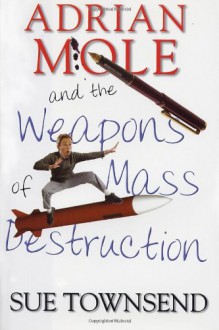
This is yet another laugh-out-loud Adrian Mole diary. This time he begins the diary at the age of 34, but he is still the same earnest, pedantic, letter-writing Adrian.
He has moved away from his flaky parents’ home into a pricey loft apartment on Rat Wharf, not realizing that there’s a reason for the “rat” appellation. It could also have been called “Aggressive Swan Wharf” for that matter, but we’ll get back to that later.
Adrian is a great admirer of Tony Blair and a staunch believer in the existence of Saddam’s weapons of mass destruction, and is thus a supporter of Britain going to war.
He is a would-be published writer but hasn’t as yet achieved any success in that field; he is working on a book to be entitled “Celebrity and madness” but neither has he yet persuaded any celebrity to allow him to interview him or her on that subject, not surprisingly, considering the title.
Adrian is the arranger of a creative writing group that meets regularly though he does not wholly appreciate the literary efforts of the others. One of the members is the elderly Gladys, who keeps writing soppy poems about cats, such as:
“Poor Blackie’s up in Heaven,
God took her life away,
He said, you’ll go to Devon,
And have a holiday.”
Unfortunately, he has little success in persuading celebrities to visit the group and give a talk; as far as I recall, Cherie Blair doesn't even deign to reply to his letter. Thus, the group rapidly dwindles to only two.
Adrian has two sons, Glenn, 17, who is in basic training in the army, and in danger of being sent off to war in Iraq, and a younger son, William, who now lives with his mother in Nigeria.
Glenn writes frequent letters to Adrian, but unlike his verbally proficient father, Glenn is rather lacking in basic grammar and spelling skills.
Adrian is still madly in love with his childhood sweetheart, Pandora, who is now a junior minister and a household name. He somehow becomes involved with a woman called Marigold and then with her sister, Daisy, even though Marigold is insisting that he marry her. There are numerous complications.
He furnishes his loft apartment with stylish new furniture not to mention curtains for his glass lavatory, whose see-through walls are extremely irritating for the prudish Adrian; but he does so through the kind services of MasterCard and Barclaycard who insist on forcing him to accept thousands of pounds in credit and sending him blank cheques; this, of course, leads to poor Adrian getting into a pretty pickle as far as his finances are concerned.
It now only remains to mention the aggressive swans that inhabit the canal adjacent to Adrian’s abode. The leader of the pack, Gielgud, is “particularly vicious” and takes an instant dislike to Adrian. The town council member to whom Adrian complains fails to understand the problem; they won’t help him get rid of the swans but will grant him help with conflict resolution work with his supposed neighbour, Mr. Swan, whom they understand to be the source of the problem.
There are many more complications and convolutions in Adrian’s story, including the problems of his parents who can’t find out which romantic partners they wish to have, and those of his gay, blind friend, Nigel.
The book is brilliantly written and uproarious and reminds us of what was going on in Britain and the world in 2002 and 2003. The main theme concerns, of course, Adrian’s obsession with the weapons of mass destruction and the war in Iraq.

 Log in with Facebook
Log in with Facebook 






